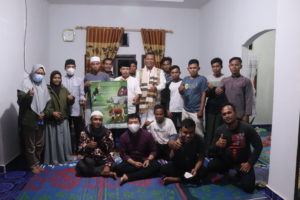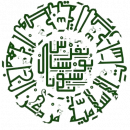Environment & Ecology in Islam – article collection, collected by Sheila Musaji
“And We created from water every living thing.” Qur’an 21:30
“Make not mischief on the earth” Qur’an 2:11
“Mischief has appeared on land and sea because of (the meed) that the hands of men have earned, that (God) may give them a taste of some of their deeds: in order that they may turn back (from evil).” Qur’an 30:41
“There is not a moving creature on earth, or a bird that flies with its wings, but they are communities like you (humans). We have neglected nothing in the Book; then unto their Lord they shall (all) be gathered.” Qur’an 6:38

Muslims are instructed to look after the environment and not to damage it:
Devote thyself single-mindedly to the Faith, and thus follow the nature designed by Allah, the nature according to which He has fashioned mankind. There is no altering the creation of Allah.
Qur’an 30:30
This is part of a Muslims responsibility to God:
Allah is He Who raised up the heavens without any pillars that you can see. Then He settled Himself on the Throne, and constrained the sun and the moon; each one pursues its course during an appointed term. He regulates it all and explains the Signs in detail, that you may have firm belief in the meeting with your Lord. He it is Who spread out the earth and made thereon firmly fixed mountains and rivers, and of fruits of every kind He has made pairs. He causes the night to cover the day. In all this, verily, are signs for a people who reflect. Qur’an 13:2-3
In 1986, at a meeting held in Assisi by WWF-International and stemming from an idea by HRH the Prince Philip, five leaders of the five major world religions – Buddhism, Christianity, Hinduism, Islam and Judaism – were invited to come and discuss how their faiths could help save the natural world. This is the Muslim declaration on Nature, taken from the original Assisi Declarations on Nature. The statement was drafted by His Excellency Dr. Abdullah Omar Naseef, secretary general of the Muslim World League.
The essence of Islamic teaching is that the entire universe is Allah’s creation. Allah makes the waters flos upon the earth, upholds the heavens, makes the rain fall and keeps the boundaries between day and night. The whole of the rich and wonderful universe belongs to Allah, its Maker. It is Allah who created the plants and the animals in their pairs and gave them the means to multiply. Then Allah created mankind – a very special creation because mankind alone was created with reason and the power to think and even the means to turn against his Creator. Mankind has the potential to acquire a status higher than that of the angels or sink lower than the lowest of the beasts.
The word ‘Islam’ has the dual meaning of submission and peace. Mankind is special, a very particular creation of Allah. But still we are Allah’s creation and we can only properly understand ourselves when we recognise that our proper condition is one of submission to Allah who made us.
And only when we submit to the Will of Allah can we find peace: peace within us as individuals, peace between man and man, and peace between man and nature. When we submit to the Will of Allah, we become aware of the sublime fact that all our powers, potentials, skills and knowledge are granted to us by Allah. We are His servants and when we are conscious of that, when we realise that all our achievements derive from the Mercy of Allah, and when we return proper thanks and respect and worship to Allah for our nature and creation, then we become free. Our freedom is that of being sensible, aware, responsible trustees of Allah’s gifts and bounty.
For the Muslim, mankind’s role on earth is that of a Khalifah – vicegerent or trustee of Allah. We are Allah’s stewards and agents on Earth. We are not masters of this Earth; it does not belong to us to do what we wish. It belongs to Allah and He has entrusted us with its safekeeping. Our function as vicegerents, Khalifahs of Allah, is only to oversee the trust. The khalifah is answerable for his/her actions, for the way in which he/she uses or abuses the trust of Allah.
Islam teaches us that we have been created by Allah, that we will return to Allah for Judgement, and that we are accountable for our deeds as well as our omissions. The khalifah will have to render an account of how he treated the trust of Allah on the Day of Reckoning. The notion that describes the accountability of the khalifah is akhirah (the Hereafter). Islam is the guidance of how to live today so that we can face the akhirah: it is the Message which informs us of what will be involved in that reckoning.
The central concept of Islam is Tawhid – the Unity of Allah. Allah is Unity and His Unity is also reflected in the unity of mankind, and the unity of man and nature. His trustees are responsible for maintaining the unity of His creation, the integrity of the Earth, its flora and fauna, its wildlife and natural environment. Unity cannot be had by discord, by setting one need against another; it is maintained by balance and harmony. Therefore, Muslims say that Islam is the middle path and we will be answerable for how we have walked this path and how we have maintained balance and harmony in the whole of creation around us.
So unity, trusteeship and accountability, that is tawhid, khalifah and akhirah, the three central concepts of Islam, are also the pilars of the environmental ethics of Islam. they constitute the basic values taught by the Qur’an. it is these values which led Muhammad, (peace be upon him), the Prophet of Islam, to say: ‘Whosoever plants a tree and diligently looks after it until it matures and bears fruit is rewarded’, and ‘If a Muslim plants a tree or sows a field and men and beats and birds eat from it, all of it is a charity on his part’, and again, ‘The world is green and beautiful, and Allah has appointed you as His stewards over it.’ Environmental consciousness is born when such values are adopted and become an intrinsic part of our mental and physical make-up.
And these are not remote, other-wordly notions, they concern us here and now. If you were to ask me what the notion of the Hereafter has to do with here and now, my answer might surprise you. I would say nuclear power and biotechnology. Both of these are very present here-and-now issues. Both have benefits and costs. Both have implications for the health and well being of mankind and nature. If I sincerely intend to be Allah’s khalifah, His steward on Earth, then I must have an opinion about them and prepare myself to make chioces about them, because I will be accountable for what mankind has wrought with these devices in the Hereafter.
Islam is a very practical world view. It seeks, in all its principles and injunctions, to give pragmatic shapes to its concepts and values. Indeed, the notion of tawhid and khalifah have been translated into practical injunctions in the Shari’ah (Islamic Law). Surah Shari’ah institutions as haram zones, inviolate areas within which development is prohibited to protect natural resources, and hima, reserves established soley for the conservation of wildlife and forests, form the core of the environmental legislation of Islam.
The classical muslim jurist, Izzad-Din Ibn Abdas-Salam, used these aspects of the Shari’ah when he formulated the bill of legal rights of animals in the thirteenth century. Similarly, numerous other jurists and scholars developed legislations to safeguard water resources, prevent over-grazing, conserve forests, limit the growth of cities, protect cultural property, and so on. Islam’s environmental ethics then are not limited to metaphysical notions; they provide a practical guide as well.
Muslims need to turn to this nexus of values, this way of understanding themselves and their environment. The notions of unity, trusteeship and accountability should not be reduced to matters of personal piety; they must guide all aspects of their life and work. Shari’ah should not be relegated just to issues of crime and punishment, it must also become the vanguard for environmental legislation.
We often say that Islam is a complete way of life, by which it is meant that our ethical system provides the bearings for all our actions. Yet our actions often undermine the very values we cherish. Often while working as scientists or technologists, economists or politicians, we act contrary to the environmental dictates of Islam. We must imbibe these values into our very being. We must judge our actions by them. They furnish us with a world-view which enables us to ask environmentally appropriate questions, to draw up the right balance sheet of posibilities, and to properly weigh the environmental costs and benefits of what we want, what we can do within the ethical boundries established by Allah, without violating the rights of His other creations.
If we use the same values, the same understanding in our work as scientist or technologist, economist or politician, as we do to know ourselves as Muslims – those who submit themselves to the Will of Allah – then, I believe, we will create a caring and practical way of being, doing and knowing; a true Islamic alternative to the environmentally destructive thought and actions which dominates the world today.
For resources, click here







